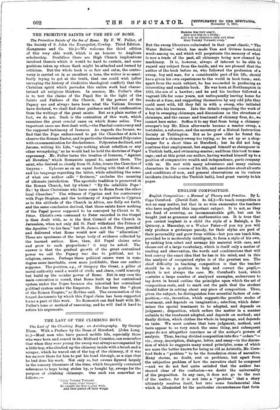(Longmans and Co. 163.)—We welcome the third edition of this
very able work, which is an honour to Anglican scholarship. Doubtless there are High Church implications involved therein which it would be hard to sustain, and some positions taken up whose flank might be attacked and turned by criticism. But the whole book is so fair and calm, the contro- versy is carried on in so excellent a tone, the writer is so mani- festly trying to get at the truth, that one could wish (after surveying the history of vindictive theological conflict) that the Christian spirit which pervades this entire work had charac- terised all religious thinkers. In essence, Mr. Puller's idea is to test the claims of the Papal See in the light of the Saints and Fathers of the Church. If the powers of the Papacy are and always have been what the Vatican Decrees have declared, we shall find clear guidance and full confirmation from the writings of the great saints. But as a plain matter of fact, we do not. Such is the contention of this work, which examines the great crucial cases on which Rome relies. Two important cases are first dealt with,—the Paschal controversy and the supposed testimony of Irenteus. As regards the former, we find that the Pope endeavoured to get the Churches of Asia to observe the Roman Easter, and in particular threatened Polycrates with excommunication for disobedience. Polycrates declined, and Jerome, writing his Life, "says nothing about rebellion or any other wrongdoing," as he would had he held the doctrine of Papal supremacy. Mr. Puller turns the treatise of Irenteue, "Against all Heretics," which Romanists appeal to, against them. The saint, who derived so closely from St. John, treats the Churches of Smyrna F Ephesus as on an equal footing with that of Rome, and his language regarding the latter, while admitting the sense of what our author calls " firstness," excludes the meaning of ultimate jurisdiction. The apostolic tradition is preserved in the Roman Church, but by whom ? "By the infallible Pope ? No! by those Christians who have come to Rome from the other local Churches." The witness of Cyprian and his controversy with Pope Stephen, and the testimony of Augustine to Cyprian as to the attitude of the Church in Africa, are fully set forth, and the same conclusion derived, that these saints knew nothing
be conveyed by Christ to St. of the Papal power supposed to Peter. Christ's own command to Peter recorded in the Gospel is then dealt with, as is the first Council of the Church in Jerusalem, when not only did St. Paul withstand the Prince of la
the Apostles "to his face," but St. James, not St. Peter, presided Qtuncey, a Macaulay, or a Walter Pater—if you try you will only produce .a grotesque parody, for their styles are part of and delivered what Rome would now call the "allocution." their. personality and grow from within—but you can teach him, These are specimens of the large body of evidence collected by provided he is moderately intelligent, to form a style of his own, the learned author. How, then, did Papal claims arise
by making him select and arrange his material with care, and and grow to such proportions ? it may be asked. The choose out of a large vocabulary, which is itself only a matter of power we call the Papacy was due to political, not to answer is that the gradual growth of the great centralised
best convey the exact idea that he has in his mind, and in this religious, causes. Perhaps these political causes were in some I the analysis s of recognised styles is of the greatest use. The supposes. The position, e.g., of Gregory the Great, a pi degree more inevitable, even more justifiable, than our author should is in a position to help and correct the pupil,— moral authority amid a world of strife and chaos, could scarcely which. is not always the case. Mr. Cornford's book, which but build up the secular power of Rome. But in any case the contains a. large number of analysed examples, endeavours to main contention is sound, that Rome built up her centralised
lay down in broad outline the principles upon which the art of system under the Popes because she inherited her centralised composition rests, and to mark out the path that the student politioal system under the Emperors. She has been the "ghost
should follow in setting about any piece of composition. Thus, of the Roman Empire," as Hobbes said. The examination of the give.n. the subject, he distinguishes four essential factors of corn- forged documents by which this Papal claim has been supported
position,—viz., invention, which suggests the possible modes of forms a part of this work. No Romanist can find fault with Mr.
Puller's tone or method of reasoning, and he will find it hard to treatment, and depends on imagination ; selection, which deter- refute his arguments.






















































 Previous page
Previous page